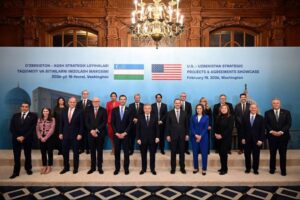Uzbek President Reviews Reforms in Employment System and Vocational Education

Tashkent, The Gulf Observer: President Shavkat Mirziyoyev has reviewed a comprehensive presentation on new approaches aimed at modernizing Uzbekistan’s national employment system and vocational education sector. The reforms are designed to reduce poverty, improve labor market efficiency, and expand income-generating opportunities across the country.
Since the beginning of this year, Uzbekistan has implemented employment and training models based on successful international practices. One of the key developments has been the active cooperation between the banking sector and mahallas (local community councils) to support employment initiatives. As a result, over 3 million individuals were engaged in income-generating activities in the first half of the year alone.
These initiatives have contributed significantly to the country’s poverty reduction efforts. According to the latest data, Uzbekistan’s national poverty rate declined to 6.8 percent as of July 1, 2025, reflecting the effectiveness of ongoing social protection and employment programs.
The presentation underscored the crucial role of vocational education in strengthening employment opportunities. President Mirziyoyev emphasized the need for enhanced collaboration between educational institutions and employers, improved training aligned with market needs, and greater private sector engagement. However, key challenges remain, including a mismatch between current educational curricula and labor market demands, as well as regulatory barriers hindering small business growth.
The underutilization of digital technologies in recruitment processes and the lack of incentives for employers to post job vacancies publicly were also highlighted as critical gaps. These shortcomings distort labor market statistics and impede the development of relevant vocational training programs.
In response, the presentation outlined a number of forward-looking reforms. Under the new model, employment services will transition from supervisory bodies into partner-oriented institutions that serve employers’ needs. Notably, it is proposed to eliminate penalties for employers who do not report job vacancies or reject referred candidates. This change is expected to improve the accuracy of labor market data and enable better job matching while preserving the employer’s autonomy in hiring decisions.
A key component of the reform is the development of a dedicated electronic platform for employment services, which will be launched in a pilot phase in Tashkent before being rolled out nationwide. This platform will enhance data transparency and streamline job matching processes.
Furthermore, vocational training programs will be adjusted to prioritize occupations with persistent labor shortages. Selected Vocational Skills Centers will be specialized by industry, and representatives from the private sector will play a larger role in curriculum development and practical training delivery.
Plans are also underway to introduce a three-tiered system of vocational education. As part of this model, free online video courses will be developed, and employed citizens will be offered opportunities to upskill or retrain using government-issued professional vouchers.
President Mirziyoyev stressed that the training of qualified specialists is one of the most critical factors in reducing unemployment and poverty. He instructed responsible agencies to ensure the successful implementation of the new model and to intensify efforts in aligning vocational education with the evolving demands of the labor market.


